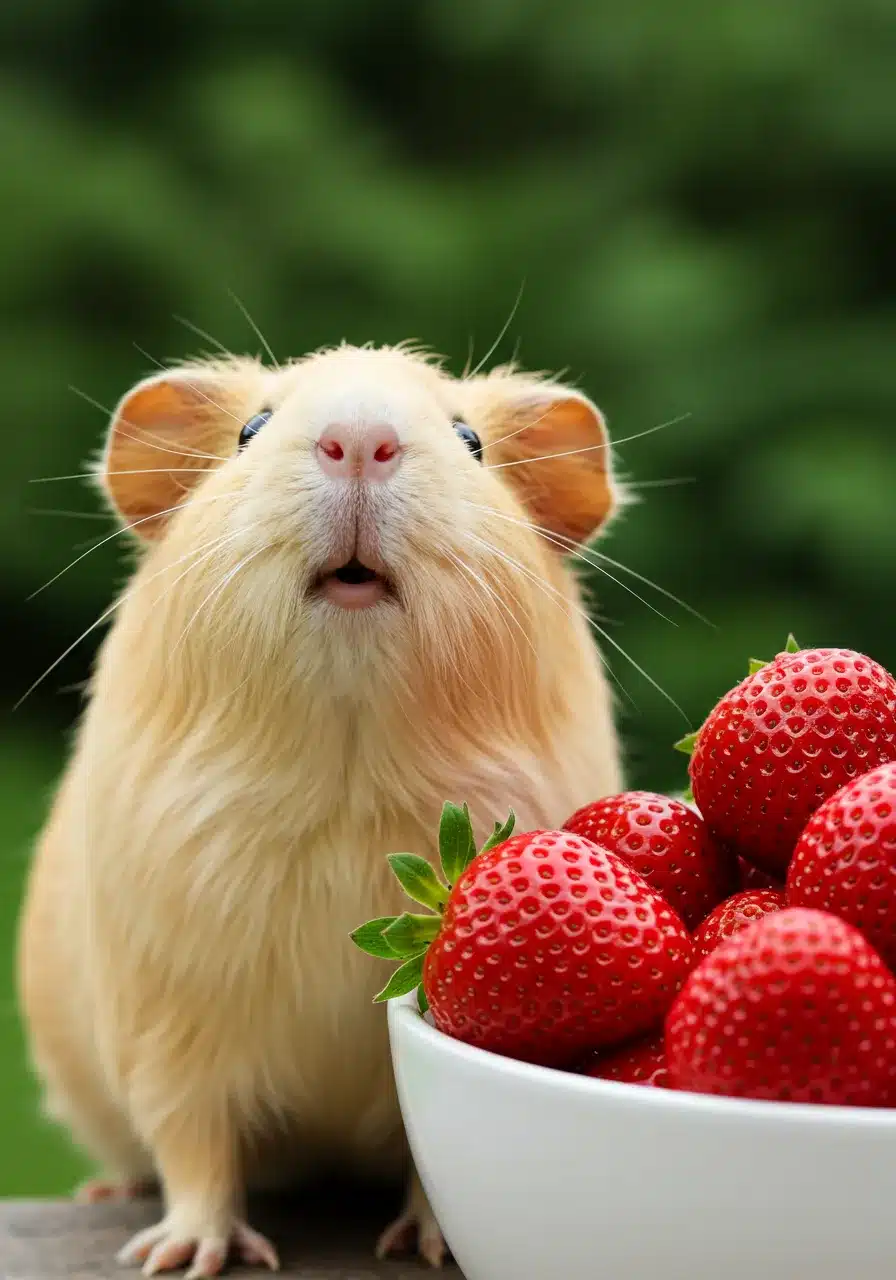Welcome to Recipes2Gather, where we explore the joy of creating and sharing all things delicious—including how we care for the little companions in our lives. If you’ve ever wondered, Can guinea pigs eat strawberries?, you’re not alone. It’s a question many pet-loving foodies ask while enjoying fresh berries in their kitchen.
Strawberries may be sweet and packed with nutrients, but are they a safe and healthy treat for your furry friend? In this post, we’ll dive into the nutritional value of strawberries, what makes them tempting for guinea pigs, and how to offer them responsibly. Whether you’re new to small pet nutrition or simply curious, you’ll find answers, practical tips, and peace of mind right here.
Let’s explore this fruity favorite together—because caring for our pets is just as rewarding as cooking for the people we love.
Can Guinea Pigs Eat Strawberries?
Yes, guinea pigs can eat strawberries—but with a few important guidelines to keep in mind. These vibrant, juicy fruits can be a delightful treat for your furry friend when served properly and in moderation.
Strawberries are not just tasty; they also offer a small dose of nutrients that can benefit your guinea pig’s diet. However, because of their natural sugar content, they’re best enjoyed occasionally, not as a daily snack.
If you’re slicing up strawberries for a smoothie or maybe whipping up a batch of brown butter rice crispy treats, you might be tempted to share a piece with your pet. Before offering strawberries, it’s important to understand a few essential details.
- Strawberries are safe for guinea pigs in small quantities.
- They should be fresh, ripe, and washed thoroughly to remove pesticides or chemicals.
- Offer only the soft, inner part of the strawberry, and skip the leaves and stems, as they aren’t suitable for guinea pigs.
Like any treat outside of their regular hay, pellets, and veggies, strawberries should be seen as a once-in-a-while addition—not a staple in your guinea pig’s diet.
Think of strawberries as a sweet little bonus—not a meal replacement. As long as you treat them like the special snack they are, your guinea pig will stay happy and healthy.
Nutritional Benefits of Strawberries for Guinea Pigs
Strawberries might be tiny, but they’re bursting with flavor—and for guinea pigs, they offer more than just a sugary bite. These berries offer several nutritional perks that can support your pet’s overall well-being when given responsibly.
Here’s a closer look at why strawberries can be a smart occasional treat:
1. Rich in Vitamin C
Since guinea pigs are unable to make their own vitamin C, they rely on food sources to meet this essential nutritional need. Strawberries are a natural source of this essential vitamin, which helps support:
- A strong immune system
- Healthy skin and coat
- Proper joint and tissue function
2. Hydration Boost
Strawberries contain lots of water, perfect for warmer seasons. This makes them a refreshing option alongside something seasonal like Christmas cranberry salad.
3. Low in Calories and Fat
Strawberries are naturally low in fat and calories, which means you can offer a small piece without disrupting your guinea pig’s balanced diet. It’s a guilt-free snack that won’t pack on unnecessary weight.
4. Antioxidants and Fiber
These berries also contain antioxidants and a bit of dietary fiber. Antioxidants support cellular health, while fiber aids digestion—two small but meaningful contributions to your guinea pig’s health.
Risks and Precautions
While strawberries can be a fun treat for your guinea pig, it’s important to be aware of a few potential downsides. Like many fruits, strawberries contain natural sugars and compounds that may not always agree with your pet’s delicate digestive system. Understanding the risks will help you make the best choices for your furry friend’s health.
Below are a few key concerns to keep in mind when feeding strawberries to your guinea pig:
1. High Sugar Content
Strawberries may be low in calories, but they do carry a fair amount of natural sugar. Feeding too many sugary fruits can lead to:
- Digestive upset
- Weight gain
- Long-term issues like diabetes or obesity
Tip: Limit treats like strawberries to once or twice a week and always offer small portions.
2. Pesticide Residue
Non-organic strawberries are often treated with pesticides, which can be harmful to guinea pigs. Traces of these substances can remain on the fruit’s surface and become harmful if not thoroughly cleaned.
Solution: Always wash strawberries thoroughly under cold running water, or choose organic varieties when possible.
3. Allergic Reactions or Sensitivities
While it doesn’t happen often, certain guinea pigs may have trouble digesting strawberries. If it’s your pet’s first time trying them, observe for any changes in behavior or digestion such as:
- Soft stools
- Lethargy
- Reduced appetite
If you notice any unusual symptoms, discontinue the fruit and consult a vet.
4. Choking Hazards or Overripe Fruit
Large chunks or mushy, overripe strawberries can be difficult to chew or may upset their stomach. Be sure to slice the fruit into tiny, easy-to-eat portions to prevent choking.

How Often Can Guinea Pigs Have Strawberries?
Strawberries may be tempting to offer more frequently, especially when your guinea pig shows excitement at the first bite. But like all sweet treats, moderation is key to keeping their diet balanced and their digestive system healthy.
So, how often is safe?
Recommended Frequency:
You can feed your guinea pig strawberries once or twice a week at most. This ensures they enjoy the nutritional benefits without the drawbacks of excess sugar.
Portion Size Tips:
- Offer a small slice or a couple of bite-sized pieces—roughly the size of a thumbprint.
- Avoid giving a whole strawberry, even a small one. Feeding a large amount in one sitting may lead to digestive discomfort.
- If you’re introducing strawberries for the first time, start with a tiny amount and observe how your guinea pig reacts.
Rotate With Other Fruits:
It’s a good idea to rotate strawberries with other safe fruits like blueberries, apple slices (without seeds), or pieces of pear. This keeps their treat intake varied and helps avoid sugar overload from one particular source.
Signs You’re Feeding Too Much:
If you notice any of the following, cut back on the fruit:
- Loose stools
- Less interest in hay or pellets
- Unusual weight gain
Also, try rotating with other safe fruits—just as you’d rotate go-to comfort dishes like macaroni and cheese to keep variety in your diet.
How to Safely Serve Strawberries to Your Guinea Pig
Offering strawberries to your guinea pig can be a fun way to add variety to their diet, but it’s important to prepare them properly. Safe serving ensures your pet enjoys the treat without any unnecessary health risks.
Here’s a simple step-by-step approach to help you get it right:
1. Choose Fresh, Ripe Strawberries
Pick strawberries that are bright red, firm, and free from mold or bruises. Overripe or spoiled berries can upset your guinea pig’s stomach.
2. Wash Thoroughly
Always rinse strawberries under cold water to remove dirt, bacteria, and pesticide residues. This step is essential, especially if you’re not using organic produce.
3. Remove the Green Tops
Cut off the leafy tops and any attached stems. These parts are not recommended for guinea pigs and can be tough to digest.
4. Slice Into Small Pieces
Chop the strawberry into tiny chunks to make it easy for your guinea pig to chew and reduce any choking hazard. A few bite-sized bits are all they need.
5. Serve at Room Temperature
Avoid serving cold strawberries straight from the fridge. Let them sit for a few minutes so your pet doesn’t get a shock from the temperature.
6. Observe and Clean Up
After serving, watch how your guinea pig reacts. Remove any uneaten fruit after an hour to prevent spoilage and keep their space clean.
Final Thoughts: Treats vs. Daily Diet
Strawberries can be a delightful and nutritious treat for your guinea pig, but they should never replace the core elements of a balanced diet. While the occasional fruit can brighten up their mealtime and offer a boost of hydration and vitamin C, it’s crucial to view these treats as just that—occasional.
A guinea pig’s primary diet should be built around:
- Fresh hay, which supports digestion and dental health
- High-quality pellets, formulated specifically for guinea pigs
- Leafy greens and safe vegetables, rich in fiber and essential nutrients
- Fresh water, always available and changed daily
Fruits like strawberries are in the same “occasional indulgence” category as a human’s favorite holiday comfort dish like candied yams.
Keep in mind, not all guinea pigs will react the same way to new foods. Some may love strawberries, while others may prefer a slice of cucumber or bell pepper. Observe their preferences and monitor for any digestive changes when introducing new treats.
Trusted Expert Opinions on Whether Guinea Pigs Can Eat Strawberries
- According to the American Society for the Prevention of Cruelty to Animals (ASPCA), strawberries can be a safe treat for guinea pigs when given in moderation and prepared properly, such as by washing thoroughly and removing the leaves.
- Veterinary experts from PetMD confirm that strawberries offer beneficial nutrients like vitamin C but caution against overfeeding due to the natural sugar content that can lead to digestive issues.
- The RSPCA emphasizes that while fruits such as strawberries can be part of a varied diet, the foundation of a guinea pig’s nutrition should still be hay, leafy greens, and species-specific pellets.
FAQs About Guinea Pigs and Strawberries
Yes, guinea pigs can safely eat strawberries in moderation. Strawberries are a good source of vitamin C, which is essential for guinea pigs, but they also contain natural sugars. Offer a small slice once or twice a week as a treat, and always wash the fruit thoroughly.
Many guinea pigs enjoy fruits like strawberries, apples (without seeds), blueberries, and oranges. However, because of the sugar content, fruits should only be given occasionally. The favorite often depends on the individual guinea pig’s preferences.
Fresh, clean water should be the only drink provided to guinea pigs. Avoid giving them juice, milk, or any sweetened liquids, as these can upset their digestive systems. Hydration through water-rich vegetables like cucumber is safe, but not a replacement for water.
Guinea pigs typically love fresh vegetables like romaine lettuce, bell peppers, and carrots. They also enjoy hay, which should make up the majority of their diet. Occasional fruits like strawberries are popular treats, but fresh greens and high-fiber hay remain their essentials.

